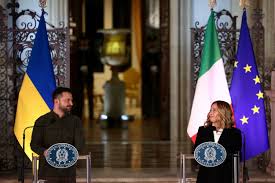How Italy is poised to contribute to Ukraine’s demining efforts

Rome: Italy is considering a direct and more substantial role (including technical-military support) in securing Ukrainian territory—not by sending combat troops, but by contributing to the essential reconstruction operations once Russia’s full-scale invasion has been halted.
Rome seeks to step up its role in the aftermath of the Trump-Putin meeting, bringing technical expertise and political weight to pursuing a just and lasting peace—though Moscow so far lacks the will.
Unlike London and Paris, Rome will not deploy soldiers as “peacekeepers,” but intends to provide strategic assets in key sectors.
The Meloni government aims to reinforce coordination with allies and position Italy as a credible and reliable actor in the postwar process.
How? The Italian plan. Italy has capabilities and expertise in several domains recognised at the global elite level, and Rome intends to leverage these strengths to play a more operational role.
Italian Army and Navy units are ready to deploy specialists to remove anti-tank and anti-personnel mines as well as other unexploded ordnance (an estimated 30% of the country is at risk). The operation would be lengthy, potentially involving up to 5,000 personnel.
Possible deployment of minehunters and frigates to the Black Sea, as already proposed during Mario Draghi’s government in 2022.
A central role in airspace monitoring and air policing operations, in coordination with allies.
Italian intelligence personnel could be engaged in on-the-ground security cooperation. By the numbers. Mines not only pose a lethal risk to civilians and soldiers, they also block farmland, delay reconstruction, and threaten commercial shipping routes—turning demining into one of Ukraine’s biggest long-term security and economic challenges.
Between the lines. Foreign Minister Antonio Tajani, speaking with media at the Meeting of Rimini, the traditional political gathering of Communion and Liberation (an international Catholic movement with a conservative orientation), stated: “We are not in favour of sending troops, but we could make an important contribution given the extensive experience we have in both maritime and land demining.”
He also stressed the need for the West to present a unified front: a message that clearly signals the government’s position, both operationally and politically—echoing Prime Minister Giorgia Meloni’s emphasis on Western unity during the summit with Donald Trump and other European leaders at the White House last Monday.
Rome seeks to prevent the conflict from freezing while demonstrating its strategic weight to allies.
While maintaining a cautious stance on the deployment of combat forces, a technical-military mission would consolidate Italy’s role as a central player in European stabilisation and security and Ukraine’s reconstruction—a process in which Rome has already taken the lead, having hosted the Ukraine Recovery Conference in early July.





